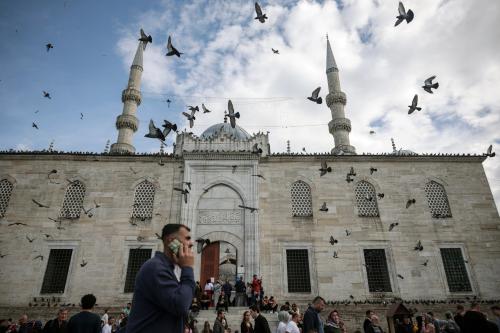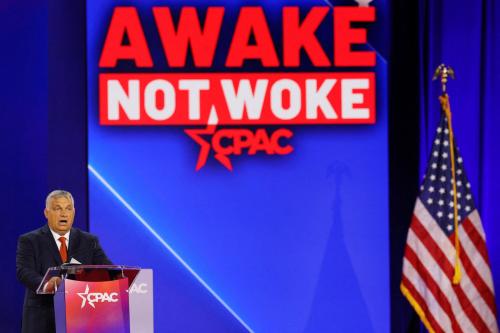A crowd of about 500 Muslims gathered on Sunday at the Islamic Society of Boston Community Center in Roxbury to hear Tariq Ramadan, a controversial figure whose grandfather was a founder of the Muslim Brotherhood. Swiss-born Ramadan has no formal ties to the Brotherhood, an Islamist movement that began in Egypt and is now an important political force throughout the Muslim world, even as its commitment to democracy is widely debated. Yet his passionate criticism of US foreign policy has earned him enemies here.
Ramadan seeks to negotiate the treacherous territory between the West and Islam, causing many to accuse him of talking out of both sides of his mouth. His speeches and books are subject to intense, even obsessive scrutiny. In 2004 the Bush administration denied him entry to the United States under provisions of the Patriot Act. But the ban was lifted this past January, and for the past several weeks Ramadan has been speaking widely across the nation.
Sunday’s speech was also controversial because it was held at the recently opened Roxbury mosque. Critics have accused the mosque’s backers — including the Muslim Brotherhood’s American branch, the Muslim American Society— of being extremists.
Now a professor at Oxford, Ramadan has been urging Muslims in the United States to overcome their “us versus them’’ mentality and finally embrace this non-Muslim society as their own: “You are at home in this country. The American people are your people.’’
Emphatically rejecting any notion of converting Americans to Islam, Ramadan urges Muslims to bring their Islamic values into the civic sphere and “change this society for the better.’’ Reminding Muslims that “we have values in common with other Americans,’’ he encourages them to reach out to non-Muslims and atheists on the basis of “universal principles.’’
So Ramadan tells Muslims that they must contribute to this society by struggling for “social and economic justice’’ and overcoming racism, poverty, and inequality — for all Americans. He insists on the equality of women in the workplace and in the mosque. Overseas, he urges Muslims to speak up for American values and democracy, reminding them that “we don’t accept torture and extraordinary rendition.’’ Citing our experience in Vietnam and today in Iraq and Afghanistan, Ramadan urges Muslims to have the courage to say no, and thereby “be more faithful to America’s values than many Americans are.’’
Many Americans will not like the sound of this. But many will. Either way, there is no reason to question Ramadan’s sincerity. His views are broadly consistent with what most Muslim leaders here are telling their fellow believers.
But there is a broader political context here that is critical to understand. Ever since 9/11, Muslim-American leaders have been at pains to distance themselves from the conservative Republicans with whom they had previously been allied, notably when they endorsed George Bush in 2000. To engage with liberals who have reached out to them, these leaders have backgrounded the conservative social values that Muslims still share with Republicans. So when Ramadan urges Muslims to bring their values into America’s civic arena, it is striking that he says nothing about social issues that Muslims, along with many other Americans, feel intensely about, such as abortion, homosexual marriage, pornography, gambling, and alcohol and drug abuse.
No mystery here. Muslim-American leaders are merely repositioning themselves in response to overtures from newfound, desperately needed allies.
But will it work? Clearly, many non-Muslims are suspicious. And many Muslims appear unpersuaded. Ramadan’s effort to refashion a modern, cosmopolitan Islam risks leaving many traditionalist Muslims behind. One telling indicator was the polite but tepid reception he received last month when he presented his views to 1,500 Muslims in suburban Chicago.
As for Muslim youth, among whom Ramadan has undeniable appeal, similar questions arise. It is simply not evident that his earnest rejection of emotionalism and insularity in favor of more spiritual and universalistic values will engage young Muslims negotiating daily challenges to their identity and loyalty as Americans.
In a curious way, Americans have seen this movie before. In the midst of the Cold War, mainline Protestant leaders overcame denominational rifts and successfully fashioned a more liberal version of their beliefs. But one result was a tepid universalism that helped fuel the growth of evangelical and fundamentalist churches. As Ramadan travels around the United States, we might all ponder whether his version of Islam could similarly fail to appeal to many Muslims, old and young, who might then be tempted by more problematic versions of the faith.
The Brookings Institution is committed to quality, independence, and impact.
We are supported by a diverse array of funders. In line with our values and policies, each Brookings publication represents the sole views of its author(s).



Commentary
Op-edA Testing Attempt for Islam’s Center
May 18, 2010